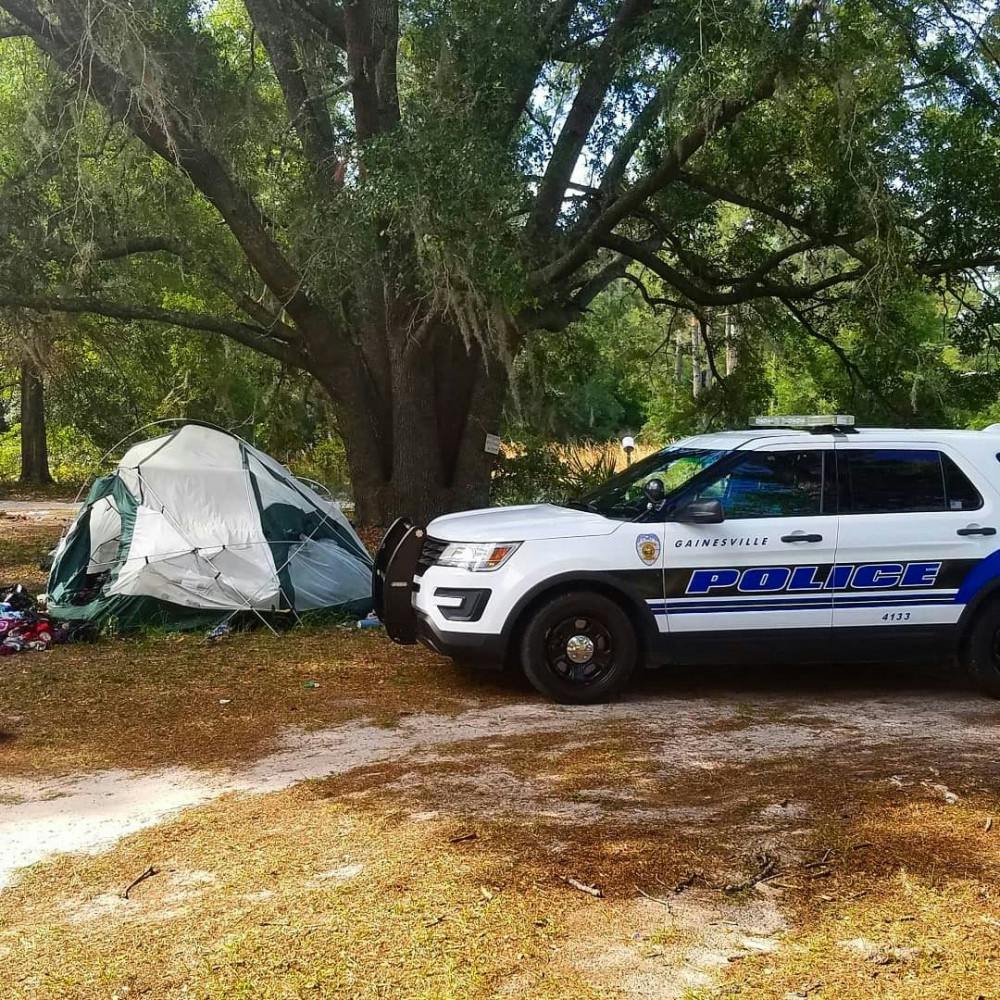Venettia Moultrie stood on the property she called home and watched as bulldozers prepared to clear her community’s belongings.
“I lost everything,” she said. “I had my one change of clothing.”
Moultrie was one of at least 10 Gainesville residents told to abandon their temporary residential encampment on Northeast 39th Avenue Thursday, despite warnings from the Centers for Disease Control and Prevention against breaking up homeless communities during the COVID-19 pandemic.
For nearly a month, residents received orders to leave, said Jordan Mazurek, an organizer with Gainesville Incarcerated Workers Organizing Committee. But the bulldozers still came as a surprise.
Previous deadlines given by the Florida Department of Corrections and Gainesville Police were unclear and had not been followed up on by officers, Mazurek said.
But Thursday was different. A motorcade of Florida Department of Corrections and Gainesville Police vehicles approached the site with an ultimatum: the homeless community living there had six hours to leave.
The encampment was once a safe haven to 50 homeless residents before interactions with FDC and GPD began, Mazurek said. The FDC first told residents they were trespassing on its property about a month ago, as the encampment is near the Santa Fe Bridge Community Release Center.
The lot was vacant for years, and there were no signs indicating the encampment’s residents were trespassing on FDC property, said Kimber Tough, a homeless outreach paralegal with Southern Legal Counsel, which offered the 50 residents legal assistance.
Of the 50 people originally living on the property, only 10 were left after police presence forced others to relocate, Mazurek said. Thursday was the first time they were given written notices to leave.
They watched silently as FDC officers slipped trespass notices through the flaps of tents scattered across the otherwise vacant lot, Tough said.
“To be homeless alone is dangerous, so people create their own family,” she said. “What is a family unit if it's not people that love you and support you and protect you?”
Volunteers from IWOC and SLC helped residents pack before the six hours were up, but some items were left behind. According to the written trespass notice, all belongings left on the property would be disposed of.
“Folks had to move out in a very big hurry,” Mazurek said. “We were using two trucks to help move what we could all day, but there were still things left behind.”
After hours spent packing, Tough said she went home sunburned and exhausted.
“I went to my privileged, concrete block home,” she said. “Those people live their everyday lives to the elements.”
Kirsten Anderson, Southern Legal Counsel’s litigation director, said the property’s lack of signs was alarming.
“If you have a piece of land that isn't posted, and it doesn't have signs, you can't be arrested for trespassing,” Anderson said. “You're not committing a crime of trespassing until someone with legal authority actually tells you, ‘You can't be here.’”
Anderson said she felt that there could’ve been alternative housing options provided for those who were displaced.
Through the CARES Act and actions from the Federal Emergency Management Agency, federal funds have been used by communities across the U.S. to find alternative housing for homeless people, Anderson said. She pointed to Connecticut, which issued an executive order to provide options for homeless people during the pandemic. Using FEMA funds, Connecticut set up spaces in hotels, dormitories and other facilities.
Tough and Anderson both said the closure of Dignity Village in March could be the reason the new encampment was formed. Dignity Village, previously supported by Grace Marketplace and joint-funded by the City of Gainesville and Alachua County commissions, was closed due to reports of violence, drug abuse and disruption of downtown restaurants.
“I don't think that there's any coincidence that this popped up related to the timing of the closure of Dignity Village,” Tough said. “I think that a lot of people were displaced in that closure plan, and they needed a place to go and housing was not available or offered.”
While Thursday’s closure wasn’t as large as Dignity Village’s, it forced at least 10 people to move, Grace Marketplace Executive Director Jon DeCarmine told The Alligator.
Grace Marketplace, a Gainesville homeless shelter that works to end homelessness and provide permanent housing solutions, isn’t currently taking in new residents but continues to provide aid for displaced individuals, DeCarmine said. The organization worked with the UF Mobile Outreach Clinic to provide COVID-19 testing to those in the encampment.
Eight of the remaining 10 residents from the encampment were tested. While waiting for the results, the eight encampment residents were offered shelter separate from other Grace residents.
DeCarmine said he didn’t believe the encampment was related to the closure of Dignity Village, but agreed that the FDC’s actions went against CDC guidelines. He said Grace Marketplace employees visited the encampment and prepared individuals by offering moving assistance and shelter.
After moving from the encampment, Moultrie returned to help the members of her community. She has a directory of 30 homeless individuals who were displaced from Dignity Village and Northeast 39th Avenue.
“I have contact numbers and dates of birth, and some of them are elderly or disabled,” she said. “I have demographics on each of these people, and I have folders that I have made up for the people with basic needs that they weren't able to access before.”
According to Moultrie, it’s the responsibility of humanity to offer help where it’s needed, regardless of if someone lives in a tent or in a traditional home.
“When you're in a corner where you feel like you have nothing or no one, Kimber and her team stepped in, with no question, no second guess, no stipulations, no bias and no comments, and they brought hope,” she said. “Compassion is what people are supposed to do for other people. And not just people that are homeless—it’s deeper.”
Contact Avery at alotz@alligator.org. Follow her on Twitter @ajlotz8.
Gainesville Police assisted the Florida Department of Corrections in communicating with members of the encampment on FDC property.






